|
|
|
Sort Order |
|
|
|
Items / Page
|
|
|
|
|
|
|
| Srl | Item |
| 1 |
ID:
156329
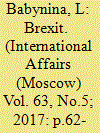

|
|
|
|
|
| Summary/Abstract |
IN JUNE 2016, Eurosceptics won the referendum on the UK's membership in the European Union. In March 2017, UK Prime Minister Theresa May notified Donald Tusk, President of the European Council, that Great Britain intended to leave the EU; this triggered Article 50 of the Lisbon Treaty. The British government needed nine months to formulate its vision of the future relations with the EU and outline the parameters of withdrawal. British proposals, however, multiplied questions rather than provided answers. The EU leaders, on the other hand, have their own ideas about the conditions, on which the UK will be allowed to quit. The sides' initial positions differ to the extent that the road toward a compromise looks difficult, not to say tortuous.
|
|
|
|
|
|
|
|
|
|
|
|
|
|
|
|
| 2 |
ID:
156342
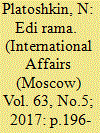

|
|
|
|
|
| Summary/Abstract |
Back in the 15th century, the great Albanian warrior George Castriot, who is also known as Skanderbeg1 (a corruption of the name Iskender Bey given to him by the Turks as a respectful comparison to Alexander the Great), single-handedly fought Ottoman expansion in the Balkans for decades. The pope welcomed Skanderbeg in his residence, and Rembrandt considered it an honor to paint a portrait of him. The West, with its profuse espousal of Christian values, promised help to Albania, but, as usual, failed to keep its word. Incidentally, Skanderbeg was portrayed in the Soviet-Albanian film The Great Warrior Skanderbeg, which came out in 1953 and was directed by Sergey Yutkevich, a Soviet director and screenwriter. The movie was a remarkable event, and what made it so was not only the cinema debut of brilliant Soviet actor Yury Yakovlev but also the directing prize received from the Commission Supérieure Technique of the 1954 Cannes Film Festival. In 2012, the movie was restored to mark the centenary of Albania's independence. It remains the world's best-known film about Albania.
|
|
|
|
|
|
|
|
|
|
|
|
|
|
|
|
| 3 |
ID:
156324


|
|
|
|
|
| Summary/Abstract |
Armen Oganesyan, Editor-in-Chief, International Affairs: Yury Konstantinovich, in its short-term forecast for the energy market in May, the Energy Information Administration of the U.S. Department of Energy, comes to the conclusion that oil production will grow faster than demand and the oil market will be oversupplied in the foreseeable future. Is this forecast correct?
|
|
|
|
|
|
|
|
|
|
|
|
|
|
|
|
| 4 |
ID:
156339


|
|
|
|
|
| Summary/Abstract |
THE DEATH of Helmut Kohl, the former German chancellor and an outstanding politician, reminded us of a role that can be played in history by an individual who is a strategic thinker and patient tactician, can listen to and hear partners and opponents alike, and is open to compromise if the latter is important for the survival of civilization. Alarming developments in Europe and other parts of the world show that some Western leaders' presumption of ideological superiority, political arrogance, disdain for the interests of other countries, and neglect for human life may undermine the system of international law, and sow mistrust and estrangement between nations. Kohl is justly considered one of the most prominent figures of the German political elite of the 1970s to the 1990s. In the radically changing postwar Europe, he showed himself to be a world-scale politician, doing important work for the political stability of the continent and for bringing the Cold War to an end, and advocating various forms of cooperation with the former Soviet Union and post-Soviet Russia.
|
|
|
|
|
|
|
|
|
|
|
|
|
|
|
|
| 5 |
ID:
156336
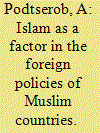

|
|
|
|
|
| Summary/Abstract |
THERE IS A RANGE OF FACTORS behind the foreign policies of Islamic countries, which include their geopolitical status, their international political and economic relations, their ideologies, and the interests of their ruling classes. Islam is one of these factors. Remarkably, while we don't use the phrase "European Christian civilization" to describe Europe, a relatively small continent, we do use the phrase "Arab-Muslim civilization" in reference to Muslim countries with the implication that Islam is a factor in their foreign as well as their home policies.
|
|
|
|
|
|
|
|
|
|
|
|
|
|
|
|
| 6 |
ID:
156327
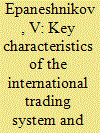

|
|
|
|
|
| Summary/Abstract |
OVER THE PAST FEW YEARS, a fairly stable growth trend in trade between Russia and the European Union has come to an end. Since 2013, the volume of trade between Russia and the EU has undergone an unprecedented decline, although there has been some growth in 2017. For several reasons, the EU has not been very concerned about this decrease.
|
|
|
|
|
|
|
|
|
|
|
|
|
|
|
|
| 7 |
ID:
156333
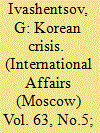

|
|
|
|
|
| Summary/Abstract |
THE YEAR 2017 has brought an aggravation of the North Korean nuclear problem. Donald Trump's assumption of office as U.S. president coincided in time with a new stage of the North Korean nuclear missile program. Kim Jong-il, the deceased father of current North Korean leader Kim Jong-un, apparently had assumed that the hypothetical possibility of retaliatory nuclear strikes against the United States and its allies was a sufficient guarantee of North Korea's security and so was quite satisfied with his country's relatively small nuclear deterrence arsenal - just about a dozen warheads - and didn't worry too much about means of their delivery. Kim Jong-un has gone further. He has ordered making more nuclear warheads and effective delivery means - intercontinental ballistic missiles (ICBMs) and submarine-launched ballistic missiles (SLBMs). This essentially means that North Korea aspires to become a full-scale nuclear power with the potential to survive a nuclear attack and inflict unacceptable damage on its adversary, the United States.
|
|
|
|
|
|
|
|
|
|
|
|
|
|
|
|
| 8 |
ID:
156337


|
|
|
|
|
| Summary/Abstract |
NEARLY 32 YEARS AGO, the International Affairs journal carried my article under the same title. These were different times; the international situation and the political priorities of the local peoples were likewise different. Certain problems are still on the agenda; they have not lost their urgency yet the approaches to their settlement and the conditions, in which they should be settled, radically differ from what we had 30 or even 15 years ago.
|
|
|
|
|
|
|
|
|
|
|
|
|
|
|
|
| 9 |
ID:
156326


|
|
|
|
|
| Summary/Abstract |
THE MAY 25, 2017 MEETING of NATO heads of state and government was from the start seen as a key political event, being a venue of U.S. President Donald Trump's first European visit. During this meeting, the new conditions for the transatlantic treaty, both within the alliance itself and in the broader context of American-European relations, had to be determined. The Trump-NATO topic was a hot issue even during the new president's electoral campaign, once he had declared the alliance to be a useless and outdated organization. NATO members had wanted to meet with the new U.S. president earlier, but this turned out to be unrealistic in light of their uncoordinated positions and the need for preliminary political and diplomatic consensus. Trump's stop-off in Saudi Arabia, where he signed a $110 billion arms deal, and his subsequent visits to Israel and the Vatican before engaging in direct dialogue with the United States' main strategic partners, served only to increase the level of concern and areas of tension within NATO.
|
|
|
|
|
|
|
|
|
|
|
|
|
|
|
|
| 10 |
ID:
156343
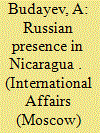

|
|
|
|
|
| Summary/Abstract |
AFTER the Sandinista National Liberation Front (FSLN) took power for a second time in 2007 and its leader, Daniel Ortega, again became president of Nicaragua, Russia's relations with that country have become closer and, moreover, acquired a new quality, developing into full-scale strategic partnership. Today, Nicaragua is Russia's main partner and ally in Central America. Russian presence in Nicaragua takes a diversity of forms - political contacts, economic relations, including trade and investment, cultural, scientific and technological cooperation. There are numerous reasons for this, primarily the two nations' desire to build equal, mutually respectful, and mutually beneficial cooperation in bilateral and multilateral formats, their deep involvement in regional political and economic processes, and their active roles in the world arena, where they hold identical or similar views on practically all key issues.
|
|
|
|
|
|
|
|
|
|
|
|
|
|
|
|
| 11 |
ID:
156330


|
|
|
|
|
| Summary/Abstract |
ON THE EVE of the presidential election in the United States, Foreign Policy ran an extremely interesting article "Why Chinese Elites Endorse Hillary Clinton,"1 in which the author argued that, despite the fairly harsh statements of Donald Trump as presidential candidate, as president he would demonstrate more lenience in his relations with China than President Hillary Clinton and that, on the other hand, as president he might contribute to global instability that, in the final analysis, would do no good to China.
|
|
|
|
|
|
|
|
|
|
|
|
|
|
|
|
| 12 |
ID:
156340
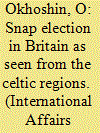

|
|
|
|
|
| Summary/Abstract |
THE SNAP GENERAL ELECTION of June 8, 2017, the third in the last two years, produced a "hung" parliament and can be described as a turning point in the country's political history. The Tories with 318 seats came closest to parliamentary majority of 326 seats; Labour trailed behind with 262 seats, followed by the Scottish National Party (35), Liberal-Democrats (12), the Democratic Unionist Party (DUP) from Northern Ireland (10), Plaid Cymru (4), and the Green Party (1). The United Kingdom Independence Party (UKIP) headed before the referendum by Nigel Farage was left in the cold. Prime Minister Theresa May, who preserved her post, announced that she would put together a minority government with the support of the Democratic Unionists, the only party that had agreed to side with the Tories on the legislation and budget issues.
|
|
|
|
|
|
|
|
|
|
|
|
|
|
|
|
| 13 |
ID:
156332


|
|
|
|
|
| Summary/Abstract |
SOFT POWER has been a familiar phrase in Russian political science discourse for more than ten years. In this period, the soft power notion has become one of the most popular themes in Russian political science, firmly established itself in Russian scholarly literature, and has been recorded in two versions of the Foreign Policy Concept of the Russian Federation and in other fundamental statements on Russian foreign policy.1,2,3 The term "soft power," which has been borrowed from works by Joseph S. Nye,4 is not a phrase that is fashionable but meaningless. It is a concept that provides a new angle of looking at many aspects of international relations.5,6,7 There also are studies on the use of soft power in international business, for instance on the efficient use of it by transnational corporations to strengthen their positions.
|
|
|
|
|
|
|
|
|
|
|
|
|
|
|
|
| 14 |
ID:
156335
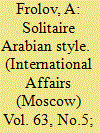

|
|
|
|
|
| Summary/Abstract |
LAST SPRING, an event in the Arab world shocked everyone. The Kingdom of Saudi Arabia (KSA), Bahrain and the United Arab Emirates (UAE) withdrew their ambassadors from Doha, the capital of Qatar, their ally. One of the smallest members of the Cooperation Council for the Arab States of the Gulf (GCC) was accused of supporting "anyone threatening the security and stability of the GCC whether as groups or individuals - via direct security work or through political influence ... and hostile media."
|
|
|
|
|
|
|
|
|
|
|
|
|
|
|
|
| 15 |
ID:
156331
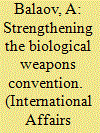

|
|
|
|
|
| Summary/Abstract |
BIOLOGICAL (bacteriological) weapons were the first category of weapons of mass destruction to come under a universal international legal ban. The Biological Weapons Convention (BWC) came into force back in 1975.
|
|
|
|
|
|
|
|
|
|
|
|
|
|
|
|
| 16 |
ID:
156341


|
|
|
|
|
| Summary/Abstract |
IN JUNE 2017, it was 25 years since the tragedy in Bendery, a Moldovan city whose population had rejected the plans of Chisinau nationalists to prohibit them from using Russian at work and in everyday life and from teaching Russian to their children. Attempts to reach a compromise on the "right to use one's own language" had failed. Moldova split apart and the conflict turned into an armed confrontation. On March 2, 1992, Moldovan troops, using armored vehicles and artillery fire and supported by Romanian volunteers, launched a full-scale military operation against Transnistria (Pridnestrovie). On June 19, 1992, almost 700 civilians lost their lives as a result of a massive artillery strike on the city of Bendery; more than 1300 people were wounded, and 100 thousand became refugees. The city was saved from destruction by the arrival of the Russian 14th Army. At a meeting in Moscow on July 21, 1992, the presidents of Russia and the Republic of Moldova, in the presence of the president of the Pridnestrovian Moldavian Republic (PMR), signed an Agreement on the Principles of a Peaceful Settlement of the Armed Conflict in the Pridnestrovian Region of the Republic of Moldova.
|
|
|
|
|
|
|
|
|
|
|
|
|
|
|
|
| 17 |
ID:
156323


|
|
|
|
|
| Summary/Abstract |
Armen Oganesyan, Editor-in-Chief, International Affairs: Sergey Alexeyevich, the anti-Russia legislation that was approved by the U.S. Congress and signed by President Donald Trump has been actively discussed recently. Does the fact that this act as such was signed mean the onset of a prolonged period of U.S. political and economic confrontation with our country or is this document, which limits President Trump's powers, more of a factor in the domestic political struggle in the U.S.?
|
|
|
|
|
|
|
|
|
|
|
|
|
|
|
|
| 18 |
ID:
156344


|
|
|
|
|
| Summary/Abstract |
ON MAY 6, 2017, the House of European History (HEH)1 opened in the Belgian capital to much fanfare. It is nothing less than a landmark project of the European Union for promoting the history of Eurointegration ideas and EU European values. More than ten years were needed to bring the project to fruition under the leadership of Hans-Gert Pöttering (Germany), President of the European Parliament from 2007 to 2009.
|
|
|
|
|
|
|
|
|
|
|
|
|
|
|
|
| 19 |
ID:
156325


|
|
|
|
|
| Summary/Abstract |
Armen Oganesyan, Editor-in-Chief, International Affairs: Alexey Olegovich, these days everything related to the weather and climate change is of special interest to us and the world at large. The reason for this are natural disasters that are uncharacteristic of the region: tornadoes, typhoons, hurricanes, and tropical storms. What is going on?
|
|
|
|
|
|
|
|
|
|
|
|
|
|
|
|
|
|
|
|
|